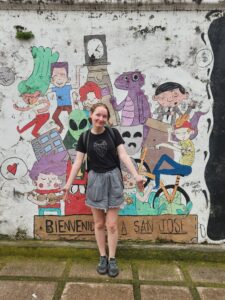When studying abroad, many programs give you options for living arrangements. Some have arrangements where you live with other students, live in an apartment alone, live in campus housing or live with a family. For the program that I am doing here in Chile, we had the option of having our housing set up through the program with a family or arranging our own housing in an apartment. Partly out of convenience, I chose the first option: being placed with a family.
The family that I was placed with consists of a mom, a dad and a 7-year-old daughter. There is another student from the United States who also lives here, which can be quite convenient at times. Both the dad and the daughter don’t speak any English, which is normal for families here, but what is not as common is that the mom speaks fluent English. This is a blessing in disguise, as when we don’t know how to say something in Spanish she can help us, but sometimes we rely on it more than our Spanish language skills.
Something unusual for studying in Chile is that although my family is living in Chile, both the parents are from Argentina. They originally came here because my host mom got a scholarship to get her masters degree at a university here. After graduating she got a job here in Santiago and the two of them decided to stay. Then they had their daughter here and keep saying that they will move back, but haven’t made any real plans to. It is really cool to live with them because we get the Chilean culture from our classes and interactions with other people, but we get a different Argentinian culture from our host family.
Although Argentina and Chile are right next to each other the two have some very different cultural differences. Number one is the language. Chilean Spanish is infamous for having a lot of slang and fast speakers and being difficult to understand, while Argentinian Spanish is slower and has a completely different accent. Instead of saying “y” when they have the “ll” like in calle, they say it with a “sh” like “cashe.” For me and for lots of people I have talked to, Argentinian Spanish is much easier to understand. After having lived with my host family for three months, I am definitely much better at understanding Argentinian Spanish. Another difference is the food. Although both cultures have similar food, in Argentina they eat much more meat than they do in Chile and they hold their meat to a higher standard (according to my host family). The traditional foods and dishes are slightly different and many of them have different names, but I like them both for their differences.
One of the best things about living with a host family is that even though you are thousands of miles away from your birth family, you still are around a family and—in my case—I have a little host sister who reminds me of my little brother. It is a double-edged sword though, because although the families are used to having students and are pretty relaxed with their rules, they still have certain rules or traditions. One example is that they have complete control over what food they buy and make for meals that we eat at their house. After having lived in an apartment, where I control what I eat and when, it is strange to have dinner made and food bought for the house, where I don’t have to do any work or put in any opinions for it. My host family is super accommodating and understanding about food that I like and don’t like. I also can’t eat gluten and they are really considerate of this and always make sure that they have something that I can eat.
No matter what housing arrangement you choose while living abroad, there are advantages and disadvantages. With a host family, I get a lot more Argentinian culture than I would if I lived by myself. I also get the opportunity to practice my Spanish with my family, especially my host sister. On the other hand, if I lived by myself I would be able to buy and make the food that I wanted for meals and do things more on my own terms. Either way you get a memorable experience living in another country, no matter how you do it.







